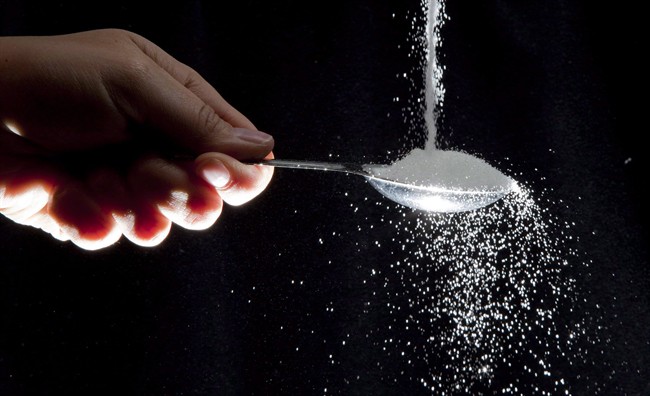How much sugar should you be consuming daily? While health officials dole out recommendations, a new Canadian study suggests guidelines aren’t based on high-quality evidence.

But the scientists behind the study — out of the Hospital for Sick Children and McMaster University — say their review shouldn’t justify eating more sugar. They’re calling into question the evidence used to pull together recommendations handed off to governments, policymakers and every day consumers.
“Although our findings question specific recommendations in authoritative guidelines, the findings should not be used to justify higher consumption of sugary drinks and beverages. We’d like these findings to improve trustworthy guidelines of sugar intake,” the review’s lead author, Dr. Bradley Johnston, told Global News.
READ MORE: How much sugar should you be eating? How to follow the WHO’s guidelines
Johnston is a SickKids scientist and professor of clinical epidemiology at the University of Toronto and McMaster. He’s a research methodologist, focusing his efforts on studying research and how to improve how it’s conducted.
His new findings, published Monday night in the Annals of Internal Medicine, are controversial. After reviewing nine public health guidelines on sugar recommendations, he suggests they were pulled together with weak evidence.
This includes the World Health Organization’s 2014 guidelines, which said sugar should make up less than five per cent of the calories you consume daily. The U.S. Institute of Medicine urged consumers to limit sugars to less than 25 per cent of total daily calories.
“We have a lot of uncertainty about whether it’s five per cent, maybe it’s seven per cent, maybe it’s 15 per cent,” Johnston said.
But critics point to one caveat of his research: it’s funded by the food and agriculture industry. They worry the findings may be tainted because of funding influence.
They’re also standing by recommendations made by global bodies.
“These [guidelines] are done very rigorously, by top world experts in the area and they’re overseen by people who do methodology very rigorously. An external group can critique these things but they’re done very well and they’re done with our public interest as the fundamental basis,” Dr. Norm Campbell, a University of Calgary professor of medicine, said.
“The greatest threat to commercial guidelines is industry influence,” he warned.
Manuel Arango, director of health policy and advocacy at Heart & Stroke, called the research “junk science.”
He said plenty of research has come to light about sugar and its role on weight gain and chronic disease.
“We know with liquid sugar you don’t get that sense of fullness like you do with solid food so it’s easy to overconsume liquid sugar. Evidence is emerging and very strong on the role of sugar and its impact on health. We have to stay the course,” he said.
“There’s evidence of how industry skews research, it’s not a surprise,” he said.
READ MORE: How much sugar and how many calories are in your summertime drink?
In response, Johnston conceded that the International Life Sciences Institute (ILSI) “essentially” funded the research. He said ILSI primarily takes money from the food and agriculture industry, with some government dollars.
“When a study is funded by industry, there’s no question there’s a perception issue but we believe we’re high integrity researchers. We’re very careful to question and monitor one another to make sure money we receive doesn’t influence efforts or conclusions,” he told Global News.
Instead of funding, Johnston said he and his team looked at how the guidelines were pulled together. They considered the consistency of the recommendations, the validity of the guidelines and how they were developed and finally the evidence propping up each recommendation.
“It’s like the analogy of drinking eight glasses of water a day. What’s the evidence behind that?” he said.
READ MORE: How much sugar are your kids eating? Take a look at 3 new sugar limit guidelines
Johnston named some issues he had: for starters, the guidelines are based on reviews of observational studies and randomized trials that have “methodological weaknesses.”
They’re not transparent, too: “Strong recommendations have to be accompanied with high-quality evidence … if you only have low-quality evidence, you should be making a weak recommendation. You need to be transparent about the quality of evidence and let decision makers make up their own mind,” he explained.
Campbell said the Canadian review has “some legitimate concerns” but that overall, the findings could confuse consumers.
Not all guidelines are “methodologically pristine” – there will always be limitations, especially in the area of nutritional research, he said. Researchers do the best they can with the tools they have in hand.
Read the Canadian review.
carmen.chai@globalnews.ca
Follow @Carmen_Chai



Comments